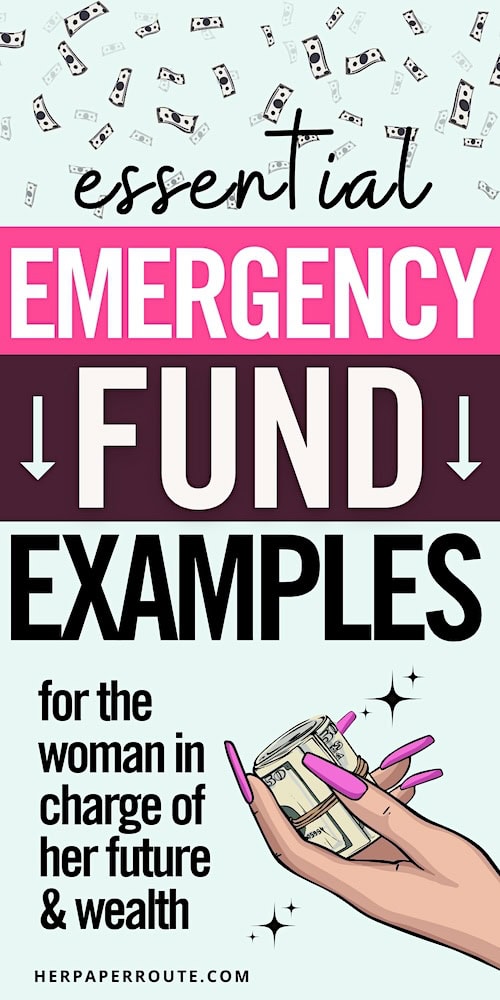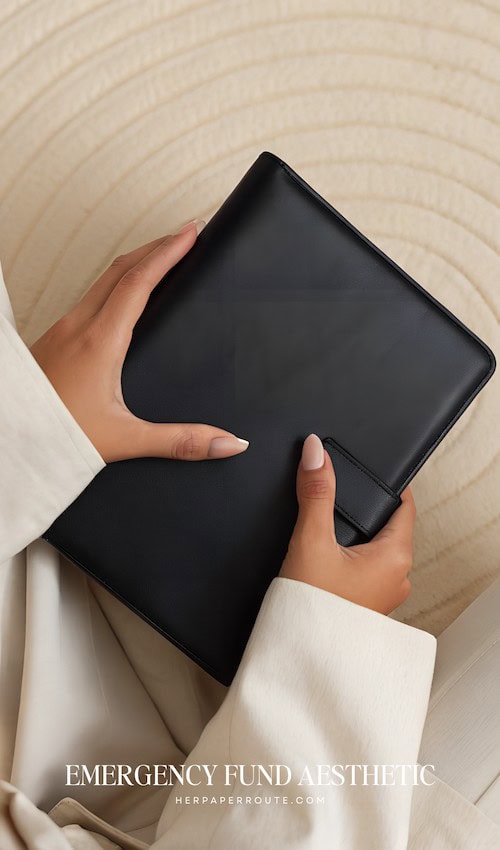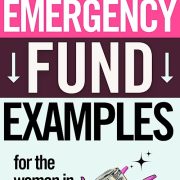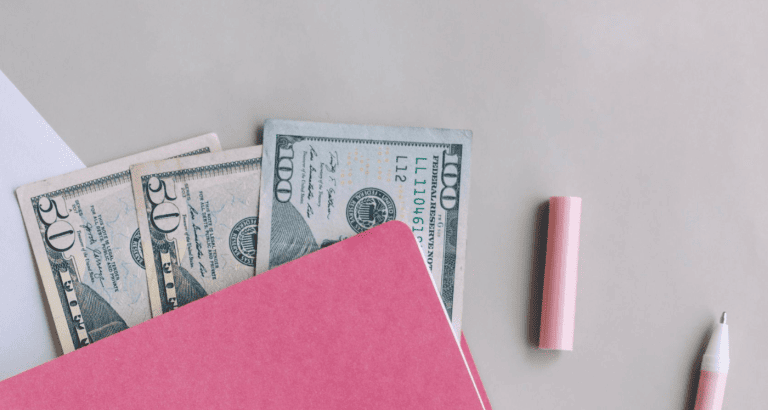Why It Pays To Have An Emergency Fund

In today’s unpredictable world, one of the smartest financial moves you can make is to set up an emergency fund.
Tell me, have you ever faced a sudden car breakdown or an unexpected medical bill and felt your heart sink, wondering how on earth you’re going to pay for it?
As an affiliate partner of various brands and sponsored content, HerPaperRoute may earn commission on qualifying purchases. Disclaimer
Welcome to the club of life’s unforeseen surprises, where the only membership requirement is, well, life itself. This is where the hero of our financial story steps in – the emergency fund.
In this article, we’re going to walk through the ins and outs of why having an emergency fund is not just a good idea, but a crucial aspect of sound financial health.

Often underrated yet incredibly vital, an emergency fund is your financial safety net, catching you when life’s little (and big) surprises try to knock you down.
It’s like having a lifeboat on your personal financial Titanic – you may never need it, but boy, will you be glad it’s there if you do! This financial safety net is crucial in navigating life’s unexpected twists and turns without derailing your long-term plans.
To get started on your emergency fund, start tracking your savings and vision board with this digital planner!
What is an Emergency Fund?
An emergency fund is essentially a stash of money set aside to cover unexpected, essential expenses.
It’s not the same as your regular savings, which you might tap into for planned expenses like a vacation or a new car.
No, this fund is strictly for those ‘oh no’ moments – like when your trusty car suddenly sounds like a lawn mower, or your job becomes a victim of budget cuts.
Reasons to Have an Emergency Fund
Imagine this: You wake up one day to a broken heater in the dead of winter. Without an emergency fund, you might resort to a high-interest credit card, spiraling into debt. You need to be prepared for scenarios like this to happen.
Anyone who is currently thinking that they don’t need an emergency fund is wrong. You can never tell what life will throw at you. And that ‘oh it won’t happen to me’ mentality is really dangerous. An emergency fund acts as a buffer, protecting you from such scenarios.
As Dave Ramsey, a popular personal finance guru, often says,
“An emergency fund turns a crisis into an inconvenience.”
How Much Should Be in Your Emergency Fund?
The general rule of thumb is to have enough to cover three to six months’ worth of living expenses.
But let’s be real – life isn’t one-size-fits-all. If you’re a thrill-seeking freelancer with unpredictable income, you might want a beefier fund than someone with a stable blog that generates 6 figures a month already.

Life Glow Up Planner

One digital dashboard to organize your entire life. Map out a complete vision board for your year, to discover your best self with our guided life planner kit.
As a general rule, I would recommend at least 6 months’ worth of your budgeted household expenses. Now you may not need 6 months’ worth of expenses in an emergency.
But 6 months means that if something else happens within that time frame you can handle it.
How To Know If YOU Need To Start Saving An Emergency Fund
Just think about your own life for a moment. If all the household income stopped what would happen?
Would those bills be paid, would the mortgage get paid, what about putting fuel in the car, medical expenses, food …
If you’re currently answering this going no all that’s fine. I’ve got a bunch of money that would keep me safe, then give yourself a pat on the back. You already have an emergency fund. (Whether you realized it or not.)
However, there are plenty of people out there who wouldn’t be able to pay those bills, or the mortgage or put fuel in the car or get food.
I would bet that there are more people out there without an emergency fund than there are with them!
If instead, you are thinking oh well I might be able to put some of it on the credit card. STOP because from this minute onwards you are in a very dangerous situation that needs rectifying.
You must put all your energy into saving up your emergency fund. (Don’t worry I will tell you how much you need to save and give you action steps on how to save your emergency fund further down the post).
Building Your Emergency Fund
Starting an emergency fund can feel like trying to climb a mountain with flip-flops – daunting, to say the least.
But as the old saying goes, “The journey of a thousand miles begins with a single step.”
Start small, maybe with a portion of your tax refund or a cut from your daily latte budget.
Before you know it, those small contributions will snowball into a respectable fund.
Action Plan: How To Start An Emergency Fund In 4 Easy Steps
Step One: Create Out A Budget
Work out your monthly household income and expenses.
If you don’t know how to do this then I would recommend reading this post about budgeting which will give you all the know-how for this step.
Step Two: Figure Out How Much Money You Need To Live On Each Month
Assess your lifestyle and decide how many months of emergency funding you need.
I recommend everyone has at least 6 months. If in doubt more emergency fund is always better.
Step Three: Cut Back and Start Saving
Discover where you can save even more. Skip those morning lattes until your emergency fund is full.
- Call up your internet company and negotiate a better deal.
- Try riding your bike more and save money on fuel.
- Go a bit “money saving extreme” until that fund is full.
Then, just start saving! I would suggest that you split the target amount into bite-sized pieces so it doesn’t feel overwhelming.
- Start by saving $1000, then the next thousand, and so on.
- Ideally, set yourself a realistic target date for each thousand to be reached and then reward yourself when you reach it.
- Just don’t reward yourself by spending money!
Step Four: Increase Your Revenue Streams
Budgeting and cutting back is all good, but the thing that will help you get ahead most is to earn more money.
- Sell stuff.
- Launch an Etsy store selling digital products.
- Offer coaching services.
- Buy a profitable online business.
- Whatever you want. Just never rely on a 9-5.
Emergency Fund Examples: How Much Should You Save?
When it comes to emergency funds, one size doesn’t fit all. The amount you need depends on your lifestyle, monthly expenses, and personal financial goals. Here are some emergency fund examples to help you gauge what might work for you:
1. The Starter Emergency Fund (3 Months of Expenses)
Ideal for those just beginning their savings journey, this fund covers three months of essential expenses like rent, groceries, and utilities. It’s a solid cushion for minor emergencies like car repairs or an unexpected medical bill. For example, if your monthly expenses are $2,000, your goal would be $6,000.
2. The Standard Emergency Fund (6 Months of Expenses)
For added security, aim for six months of expenses. This level is perfect for those with families or who work in industries where job stability can be unpredictable. If your monthly essentials total $3,000, you’d need $18,000.
3. The Extended Emergency Fund (12 Months of Expenses)
If you’re self-employed, own a business, or want maximum peace of mind, a 12-month fund can provide unmatched security. For example, someone with $2,500 in monthly expenses would save $30,000 for a full year of coverage.
4. Tailored Funds for Specific Needs
- Medical Emergencies: Save enough to cover your insurance deductible or a few doctor visits.
- Pet Owners: Budget for unexpected vet bills.
- Homeowners: Set aside funds for urgent home repairs like a burst pipe or a broken furnace.
Your emergency fund should reflect your unique circumstances. Start small with realistic goals, like $1,000, and build up over time. Use an emergency fund tracker to monitor your progress and keep yourself motivated. With these examples as a guide, you’ll be well on your way to financial peace of mind.
Tricks For Getting In The Habit Of Contributing To Your Emergency Fund
Building an emergency fund can be tough, especially when you’re juggling other financial responsibilities.
Maybe you’re like Emily, who once thought saving for an emergency fund with her entry-level salary was as likely as her cat starting to bark.
One trick is to make saving a non-negotiable part of your budget, just like rent or groceries. But, building an emergency fund is as much about developing the right habits and mindset as it is about the actual saving.
Here are some clever tricks and mindset hacks to help you consistently contribute to your emergency fund:
Automate Your Savings
Set up automatic transfers to your emergency fund as soon as you receive your paycheck.
This “out of sight, out of mind” approach ensures you save without having to think about it.
Treat It Like a Bill
Consider your contribution to your emergency fund as another non-negotiable bill that must be paid each month. This reframe helps establish saving as a mandatory part of your financial routine.
Start Small to Build Confidence
If saving large amounts feels daunting, start with small, manageable sums. As you see your fund grow, even from these small contributions, it boosts your confidence and commitment to continue.
Use Visual Motivators
Create a visual representation of your emergency fund goal, like a progress bar or a chart, and update it with each contribution. Seeing your progress visually can be a powerful motivator.
Reward Yourself for Milestones
Set milestones within your emergency fund goal and reward yourself whenever you reach one.
The reward shouldn’t undermine your savings (like a small treat or a day out), but it should be something that acknowledges your discipline and progress.
Round-Up Savings
Use a round-up saving app or tool that rounds up your purchases to the nearest dollar and saves the difference. It’s a painless way to save small amounts that add up over time.
Find a Saving Buddy
Much like a workout buddy, a saving buddy can offer mutual encouragement and accountability. Share your goals and progress to stay motivated.
Remind Yourself of the ‘Why’
Keep a clear and compelling reason for your emergency fund in your mind. Whether it’s the peace of mind, financial security, or the desire to avoid debt, remembering why you’re saving can help maintain your focus.
Cut Back on Non-Essentials
Identify one or two non-essential expenses (like eating out or subscription services) and divert that money to your emergency fund instead. It’s a sacrifice, but reminding yourself it’s for a greater cause can make it easier.
Use Windfalls Wisely
Whenever you receive unexpected money – like a tax refund, bonus, or gift – resist the urge to splurge and allocate a portion of it to your emergency fund.
The 48-Hour Rule for Impulse Buys
Implement a 48-hour rule for non-essential purchases. Wait for 48 hours before buying anything impulsively. Often, the urge to buy will pass, and you can redirect that money to your emergency fund.
Practice Gratitude
Cultivate a habit of gratitude for what you already have. This mindset can reduce the desire for new purchases, allowing you to funnel more money into your savings.
Adopting these tricks and mindset shifts can make the process of building an emergency fund less daunting and more like a natural part of your financial routine.
Where to Keep Your Emergency Fund
Your emergency fund should be easily accessible but not too easy that you’re tempted to dip into it for non-emergencies.
High-yield savings accounts or money market accounts are good options. They offer a safe haven for your funds while giving you a tad more interest than traditional savings accounts.
Utilizing Your Emergency Fund Wisely
Remember, your emergency fund is for emergencies only. That means it’s not for splurges or expected expenses. And when you do need to use it, replenish it as soon as possible.
Treat it like a loan to yourself. In essence, an emergency fund is more than just money in the bank; it’s peace of mind. It’s knowing that when life throws a curveball, you’re ready to catch it without financial worry.
So, start building your fund today. Even small steps can lead to a sturdy financial cushion that lets you sleep better at night.After all, in the wise words of J.K. Rowling:
“Rock bottom became the solid foundation on which I rebuilt my life.”
Let your emergency fund be that solid foundation for you.
Why It Pays To Have An Emergency Fund – Conclusion
To conclude, the biggest reason it pays to have an emergency fund is because with it you are safeguarding yourself and your family against anything life throws at you.
It’s about giving yourself the freedom to face life’s unexpected challenges without the added burden of financial stress.
It’s about transforming those ‘oh no’ moments into ‘I’ve got this’ ones. So, start where you are, save what you can, and grow your emergency fund gradually.
Get the Life Glow Up Planner now and let your emergency fund be your financial buffer, your peace of mind, and your testament to financial responsibility.
Do You Have An Emergency Fund?
Tell me more about how your emergency fund has saved your behinds before in the comments below.
Follow along on Instagram!











